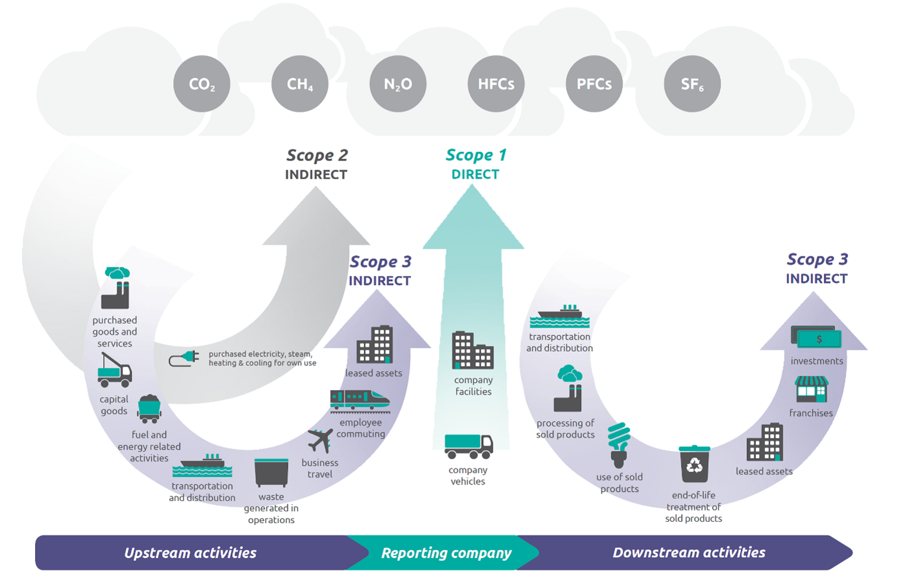The University of Twente is involved with a broad scala of suppliers. This makes assessing the environmental impact related to these purchased goods and services very important if we want to improve as a sustainable organisation. Sanne Streekstra, an Advanced Technology student, wrote her bachelor thesis on improving the carbon footprint reporting at UT.
Since 2014, the UT annually reports its carbon footprint. The assessment follows the so-called ‘Greenhouse Gas Protocol’: guidelines for conducting and reporting CO2-emissions. While conducting and reporting CO2-emissions following this protocol, emissions are categorised into three categories called scopes. Scope 1 is related to direct emissions, such as the consumption of natural gas. Scope 2 are emissions caused by the use of electricity and district heating.
The Challenge
Sanne explains: “Scope 1 and two are relatively straightforward, as the quantities of these emissions are well known to the UT. The challenge is figuring out how to assess scope 3: all emissions caused by indirect activities, over which the UT does not have direct control. For example: water usage, purchase of goods and services and travel by non-company vehicles. Scope 3 is considered to be a very broad scope. From the sandwiches in the Horst canteen to the chemicals used in the labs at Carré; CO2-emissions are emitted through each purchase.”

The solution
The reporting of scope 3 still imposes some difficulties. As far as data collection is concerned, the UT is mainly dependent on the willingness of third parties to deliver data. Currently, this is done by simply asking suppliers, who don’t always know their emissions or deliver incomplete data. Because suppliers don't provide all data, existing data cannot be verified as of right now.
This is how Sanne found out about the core of her bachelor thesis. “Through my research, I found out that the underreporting and/or absence of emission data by suppliers results in a gap in the CO2-reporting of the UT.” Sanne carried out a spend-analysis for the reporting of the scope 3-emissions. In a spend analysis, emissions are allocated to each euro spent in a certain sector. The spend-analysis showed a significant gap compared to the existing data of suppliers. “To account for these issues, a clear assessment methodology adapted for the UT could be very beneficial”, she explains.
The continuation
Now that Sanne has identified the problem and a possible solution, it’s time for the next steps. There are multiple interesting steps and solutions that can be carried out. However, emission data coming straight from the supplier is of course preferred. The methods used to gather this data can be improved. For example by incorporating emission reporting in contracts and tenders. Suppliers who can deliver emission data would be favored over those who don’t. In addition, guidelines on emission reporting could be embedded in contracts, improving the overall quality of the CO2-reporting.
“I will be working with Brechje Marechal, programme manager at the SEE programme, continuing my research and improving supplier contracts together with the purchasing department. I’m looking forward to doing further research so that we can give concrete advice regarding the solutions described above," Sanne concludes.
Want to learn more about the CO2-footprint of the UT? Click here.
Want more insight into the energy use at UT? Use our Energy Data Platform
SUSTAINABILITY AT UT
Sustainability is an important priority area of Shaping2030, the University of Twente’s strategic plan. In addition to finding sustainable solutions for societal issues, the UT wants to set a good example of what it means to be a sustainable organisation. To reach this goal, the ambitions of Shaping2030 need to be put into practice. Many members of the UT community are hard at work translating the sustainability objectives into our work on campus – transforming the way we work, teach, learn, travel, build and more. In this series, we invite them to talk about what motivates them, what the role of sustainability is in their day-to-day work, and what they would like to achieve at our university.
Want to find out more about sustainability at UT? Please go to utwente.nl/sustainability.
Written by Stef Meilink





